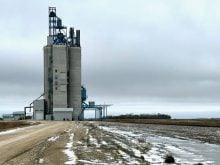A group of farmers in southwestern Saskatchewan is making one more push to convince neighbours and friends to invest in the lone railway serving their corner of the province.
The farmers want to buy Great Western Railway, which for the past four years has owned 550 kilometres of track in the area, hauling grain to the Canadian Pacific Railway main line at Swift Current.
They’re hoping to raise around $600,000, based on 300 pledges of $2,000 each from farmers.
That would be enough to make a down payment and pay for a business plan, share offering and other start-up expenses.
Read Also

Farmland ownership fires up Saskatchewan politicians
Saskatchewan politicians debate the enforcement of farmland ownership laws in the province.
The group had originally hoped to achieve its target by the end of January and begin serious negotiations with the line’s owner, Westcan Rail Ltd. of Abbotsford, B.C. But the fundraising has fallen short with only about 200 pledges received as of last week.
Spokesperson Con Johnson said the group has decided to make one more effort to convince area farmers of the benefits of buying the railway.
“We’re doing a mail drop now in those areas where we haven’t had a good response to show them the financial importance of this thing,” said Johnson.
The information being distributed consists of a single page entitled: “If you sell grain, you need our short-line railroad.”
It says the rail line provides financial benefits to grain farmers, both producer car shippers and those who receive trucking premiums to haul to elevators on the main line.
As well, communities along the line benefit from jobs, property taxes and local purchases associated with the railway, while the movement of grain by rail rather than truck reduces road maintenance costs.
“We suggest that each producer honestly look at their total annual production, determine the net cost savings this tail line is providing to their farming operations and then use a portion of the savings as a sound financial investment in both their own and this community’s future,” said the information sheet.
Johnson acknowledged that if the farmers fail to buy the line, some other entity would take it over. But he said it’s important that the rail line be in local hands.
“It’s not a huge money maker and any company that buys it is going to look for a return of their capital in seven or 10 years, and the only way to do that is to sell the line for salvage.”
Most banks and credit unions in the area are offering loans that allow producers to purchase equity in the venture at one-quarter percent over prime, with the shares purchased serving as security.
Westcan has said if a deal can’t be reached with local farmers, the company will look at other options.
That could involve applying for discontinuance or transfer under the Canadian Transportation Act, a process under which the line would be advertised for sale, offered to governments for net salvage value and then, if no buyer is found, taken out of service.
Westcan bought the line from CPR in July 2000. Saskatchewan Wheat Pool soon after closed its elevators on the line and began offering generous trucking incentives to attract grain deliveries to its big elevators on the CPR main line.
As a result, GWR is hauling only about 20 to 25 percent of the available grain in the area.
The line has become a major shipper of producer cars, which account for more than half its business.
Johnson said the group should decide after mid-February whether to continue with the project.














